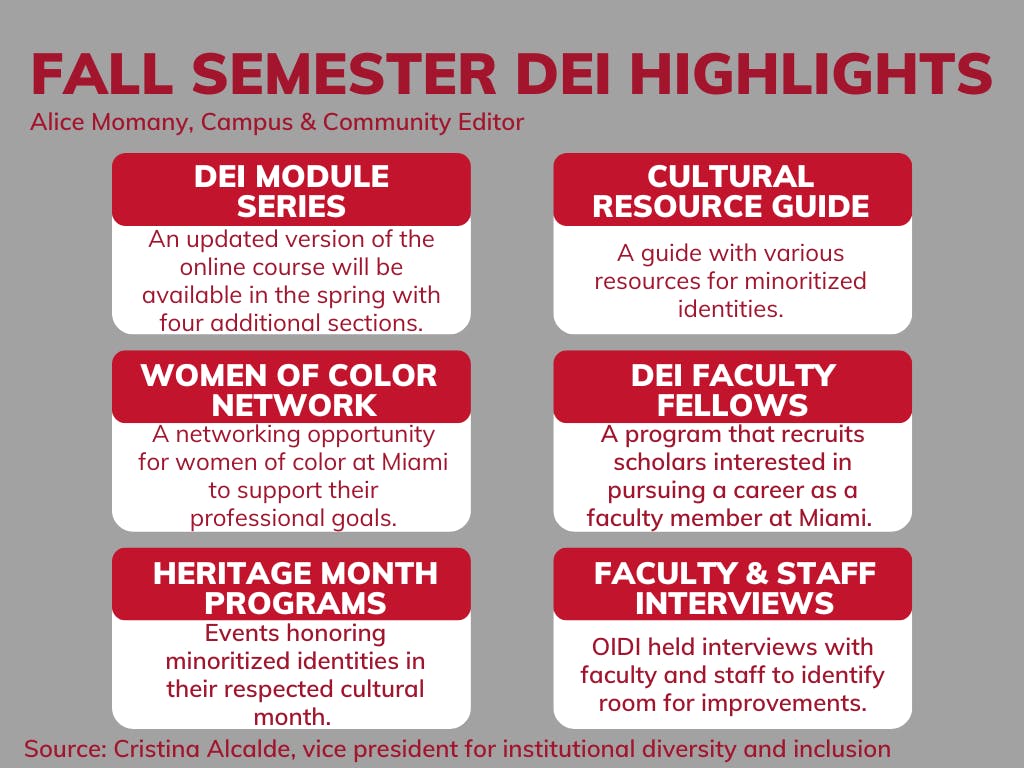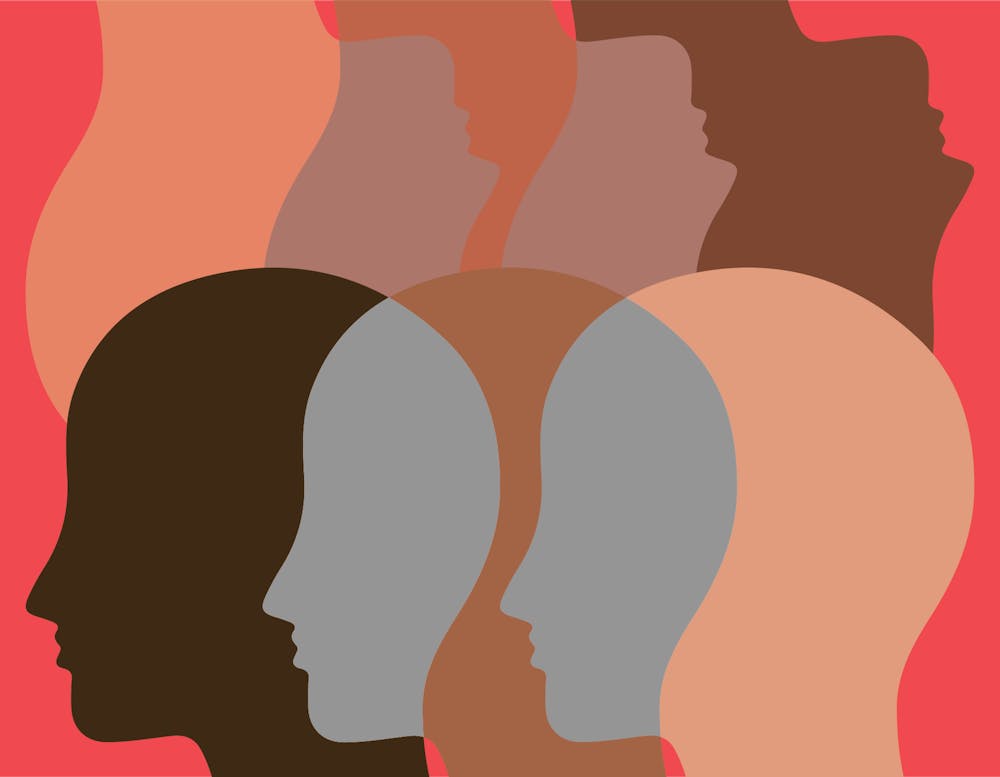The Office of Institutional Diversity and Inclusion (OIDI) at Miami University has been busy this past semester, increasing diversity, equity and inclusion (DEI) efforts across campus.
In June 2020, Miami’s President Greg Crawford created a DEI Task Force to address 44 recommendations that would promote education, celebrate diversity and create a welcoming environment at Miami. In an email to The Miami Student on Nov. 28, Cristina Alcalde, vice president for institutional diversity and inclusion, wrote OIDI has completed 92% of the 44 recommendations.
Although Alcalde did not answer what tasks OIDI has yet to complete, according to the office’s website, it has yet to finish pillars one (dialogue and allyship), three (advocacy and partnership) and five (inclusion and accountability) to conclude all 44 recommendations.
“The recommendations have been one component of a broader approach that focuses on capacity-building, recruitment and retention, structures, and accountability and transparency to create sustainable, long-term change,” Alcalde wrote.
Capacity-building has been an important focus for OIDI this semester. Capacity-building refers to the development of resources that make Miami more inclusive.
The DEI Module Series, a sequence of online courses for Miami community members, is just one example of OIDI’s capacity-building resources. The series, established in the spring 2022 semester, provides information and strategies for cultivating inclusive working and learning environments.
This past semester, OIDI evaluated the module, and an updated version will roll out this spring. The relaunched module will include four additional sections: Emotional Well-Being, Masculinities in the Workplace, Indigenous Perspectives: Miami Nation, and Intergroup Dialogue.
OIDI has also been busy developing a Cultural Resource Guide, hosting a new Women of Color Leadership Support Network, partnering with the provost’s office to launch a DEI Faculty Fellows Program and holding multiple Heritage Month Programming events.
To identify where there’s room for improvement, OIDI also conducted interviews with faculty and staff. In the spring semester, OIDI will launch a survey for all faculty, staff and students to further improve areas of inclusion.
“Findings from the interviews and surveys will contribute essential information we can analyze and use to proactively design next steps and a university-wide DEI Strategic Plan,” Alcalde wrote.

In addition to institutional DEI work at Miami, many student organizations have been working hard this semester to celebrate diversity on campus and educate their peers.
Enjoy what you're reading?
Signup for our newsletter
Miami has more than 30 multicultural organizations that serve as a space for students from different races, ethnicities and sexualities. One of these organizations is the DEI Reps, which consists of students who work to spread DEI throughout residence halls.
Maysa Constandinidis, a sophomore political science and critical race and ethnic studies double major, is the president of DEI Reps. This is its first year as an official organization, and its focus was on informing primarily first and second-year students. DEI Reps send weekly informational emails to residents and host events celebrating different cultures.
“This semester has really been about educating and having those uncomfortable conversations and making sure everybody’s on the same page,” Constandinidis said.
As the DEI Reps plan for the spring semester, they plan to invite outside voices in conversations surrounding DEI initiatives.
“Next semester, we really want to focus on bringing in speakers to our meetings,” Constandinidis said. “We didn’t really do that this semester because we focused more on events.”
Like the DEI Reps, Miami’s Center for Student Diversity and Inclusion (CSDI) has also prioritized events this past semester.
This semester, CSDI hosted its first QT-Con, a grassroots conference and convention for the queer and trans community, and a Reproductive Rights Town Hall for the Miami and Oxford communities.
“There’s constantly programming done by CSDI for affinity building and for community [building] between different identities and understanding other identities,” said Monnica Gay, an intern with CSDI.
Gay, a sophomore social work and urban planning major, said CSDI is already planning events for the spring semester. One of the larger events CSDI is hosting is the Intercultural Student Leadership Conference which will be an all-day event for students to learn from other students and listen to a keynote speaker about DEI efforts in leadership.
“We’re really looking forward to it, and we’ve been planning a lot for that … I think it’s going to be really cool, and it’s going to be really great for students,” Gay said.
Although Gay and Constandinidis are involved with DEI efforts within student organizations, both said they are aware of the actions OIDI has pursued this past semester.
Constandinidis said the size of OIDI’s staff limits the amount of work it can do, but she would like to see more from the department.
“I do see some things they are doing and working towards,” Constandinidis said. “There are some changes, but honestly, I feel like it’s the bare minimum, and I think there’s so much more that can be done.”
Constandinidis is an Arab American student and said OIDI has never previously acknowledged Arab American Heritage Month in April. After many efforts to bring this to OIDI’s attention, she said OIDI will celebrate it for the first time next year with a tabling event on Academic Quad by Miami’s seal.
However, the event will also celebrate Asian American and Pacific Islander Heritage Month and Jewish Heritage Month, both of which are in May. Constandinidis said she wishes each of these cultures could have its own celebration so students can learn more about them.
Gay disagrees with Constandinidis and commended OIDI on its work with the DEI Module Series and interviews they conducted with faculty and staff.
“I think what [OIDI] is doing is enough because, genuinely, I don’t know what else they can do,” Gay said. “I think it’s really easy to get into the mindset of saying that we want it really quickly, but institutional work, just the nature of it, is so difficult, and it takes a lot of people working for a long time rather than a couple of people getting band-aids.”
Gay said Miami has student organizations like CSDI to supplement areas that OIDI can’t allocate a lot of time to, but Constandinidis said that as much as OIDI wants to focus on the institution of Miami, it is important to remember that students make up a large part of the institution.
“They focus on the institutional level,” Constandinidis said, “which is understandable, but at the end of the day, this still affects [the student body], and this is still about us.”




